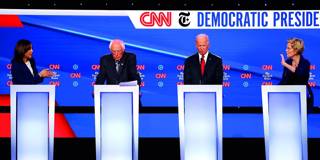The global economy could fall into recession in 2020, and the risk of major military confrontation is higher than it has been since the end of the Cold War. But, with expectations very low, it will not take much to generate positive surprises that could lead to a virtuous circle of economic improvement and less toxic politics.
CAMBRIDGE – Domestic politics, geopolitics, and economics will be intertwined in 2020 to an extent unmatched in decades. Weak economic performance and problematic governance in much of the world risks setting in motion a vicious circle: adverse economic outcomes lead to populism at home and truculent nationalism abroad, which in turn exacerbate economic problems as protectionism increases, investment declines, and consumer confidence falls off. Bad economics drives bad politics, leading to worse economics and worse politics.

CAMBRIDGE – Domestic politics, geopolitics, and economics will be intertwined in 2020 to an extent unmatched in decades. Weak economic performance and problematic governance in much of the world risks setting in motion a vicious circle: adverse economic outcomes lead to populism at home and truculent nationalism abroad, which in turn exacerbate economic problems as protectionism increases, investment declines, and consumer confidence falls off. Bad economics drives bad politics, leading to worse economics and worse politics.